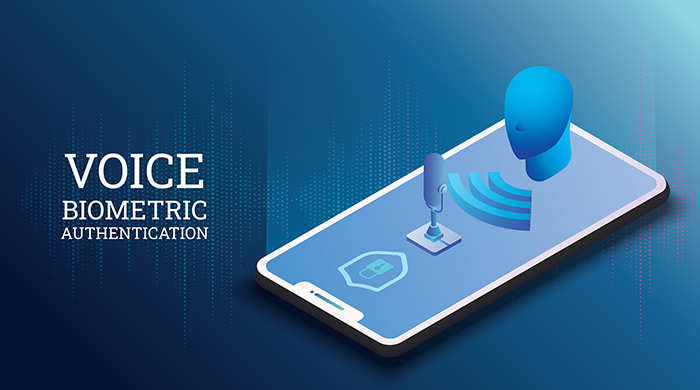Voice Biometric Authentication Explained

What does voice biometric authentication do exactly?
Voice biometric authentication allows you to use your voice as a password instead of the manual password that can be easily forgotten or hacked due to compilation weakness. Voice authentication is a biometric technique that recognizes a speaker by measuring the marked aspects in someone’s voice.
Something interesting here to note is the difference in speaker recognition and speech recognition.
In speaker recognition, the technology identifies your voice to recognize you as a person.
In speech recognition, the technology uses speech in texting applications and for active dictations in gadget assistants such as Watson and Siri. Moreover, while voice biometrics can verify the name of the speaker based on their voice, speech recognition, on the other hand, recognizes individual phrases of human speech, which is converted into text.
Types of voice authentication
There are two common forms of voice authentication engines, namely: text-independent and text-dependent.
Text independent: Here, the system does not store any pre-recorded audio to compare it with the input. It is a method of voice authentication without any prior speech content inputted into the biometric system. It is much more convenient since it offers free speech.
Text-dependent: For text-dependent recognition, a previously given paraphrase that is stored in the system has to be repeated, there is a constraint in speech content here.
How does voice biometric authentication works?
Voice biometric recognition starts with a voice input from the person whose voice identity needs to be stored in the system. This print is then kept for authentication purposes.
The voiceprint is made with the use of software that splits the statement into various frequencies. More behavioral attributes are identified at this stage that works as a team to mutually make-up the voiceprint.
Since voiceprints behave just like fingerprints, each one of them is peculiar and connected to a sole person. The prints are stored in databases to identify later and acknowledge users.
For example, during the procedure, a text-independent system will focus on matching unfamiliar speeches with the previously stored voiceprint of a person.
Applications of voice biometric authentication
- Safeguarding of bank accounts: Voice authentication can be used together with facial identification technology for security reasons when conducting bank transactions.
- Mobile applications: It can be used as a secure form of authentication in mobile apps that requires extra security for inner application payments.
- Call center attests: Voice authentication makes it easy to show beyond doubt an identity by merely discerning the voice at the other end of the call. It provides security against call center fraud, cuts down costs and airtime, keeps a quality brand identity, and upgrades customer experience.
Advantages of voice biometric authentication.
- Satisfactory customer experience: Common user authentication methods such as passwords, PINs, questionnaire-based on personal information, etc. can be a setback in customer experience as it makes the customer wait for some time before they are able to avail of any services for which they contacted the call center.
Voice authentication, on the other side, occurs passively in the background, enabling customer’s experience to be the priority, while recognizing speech without interrupting the conversation. - Increased security: Layers of security arises through voice authentication measures. The method of authentication acknowledges not only one’s voice but also their character and other factors that affect the sound. This reduces fraud as the biometric channel can quickly identify a different voice.
- Reduces operational costs: Voice authentication reduces the operational cost of call centers and even banks. It saves them millions by removing many processes that are involved in ancient authentication techniques. On an end to end conversation, it can recognize the customer’s voice to verify the identity without the requirement of standard questions.
- Protects brand reputation: Companies that use voice authentication have the advantage of protecting their brand reputation. In this era and age, where consumers are adopting online services, their trust builds when organizations ensure encryption of their account data and their privacy. Consumers can quickly shift towards competitor’s services if their information is leaked, and their confidence breached.
- Accuracy: Voice authentication is more accurate and reliable than the use of passwords that can be easily lost, changed, or guessed. It is like fingerprints, which nobody can have someone else’s. In other words, you cannot forget or recreate a voice, as in the case of passwords. Although the sound might be affected by several factors, it is much more reliable and convenient.
Voice authentication is an excellent method of user identity recognition as it brings adequate layers for security, which might not have been present before through manual pass codes.
Blogs by Category
AppForms Artificial Intelligence Blockchain Call Centers Chatbots Cloud Computing Data Management Design Digital Marketing Digital Transformation Enterprise Applications FinTech Insights LowCode Development Microsoft Mobile Apps News Office 365 Robotic Process Automation Security SharePoint Software Development Web ApplicationWhy Do You Need Contact Center Automation?

2024-05-27 13:32:37